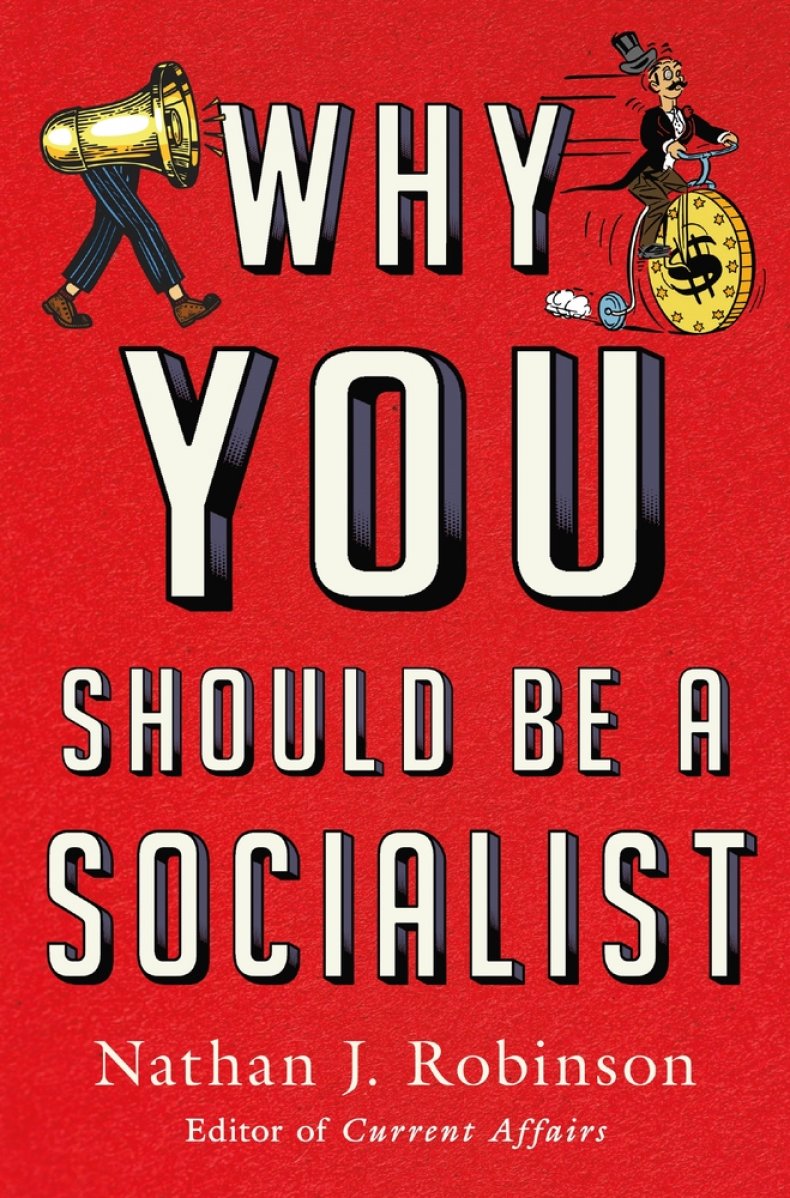OPINION
The Time Is Ripe for More Socialism | Opinion
NATHAN ROBINSON , AUTHOR AND EDITOR-IN-CHIEF, CURRENT AFFAIRS
ON 5/20/20 AT 12:32 PM EDT

Bernie Sanders, America's most prominent socialist, is known for a signature policy: Medicare For All, a single-payer system of socialized health insurance covering every American and making health care free in America. Sanders, along with others like the Democratic Socialists of America (DSA), understands that the health care status quo may be profitable for large corporations, but that it is a disaster for the American people.
Now, the coronavirus epidemic has proven the socialists completely right. With unemployment rising faster than ever before, up to nine million people may have already lost their employer-based health insurance. Under the American private insurance system, people are constantly losing their coverage because of changes in their work status—a needless cruelty that becomes even worse during a pandemic. And those who are lucky enough to keep their insurance are likely to face a nasty shock next year: premiums are going to jump substantially, absent massive government subsidies.
Yet there are countries where people do not face any such worries. In Britain, for instance, while the coronavirus epidemic itself has been disastrous, nobody needs to fear that he/she won't be able to afford care. That's because the National Health Service (NHS) covers everybody. Brits love their socialized medicine; the NHS is the most respected institution in the country, even more popular than the royal family.
American conservatives try to convince people that socialized medicine is a disaster. But public opinion polling in countries with such systems suggests otherwise. So do rankings of outcomes—a 2017 Commonwealth Fund study placed the U.K. number one in the world for effective health care services based on 72 indicators. When you look at actual data rather than anecdotes, universal government health care systems around the world perform well. (So do Medicare and TRICARE here in the United States.)
Having a tax-funded, free-at-point-of-use, universal health care system cannot prevent a pandemic outright; Britain's coronavirus outbreak has been just as bad as America's, thanks in large part to decisions made by Prime Minister Boris Johnson's Conservative government. What socialized health care can do is make sure that nobody has to worry about being able to pay for treatment. No British person has ever had to beg not to be put in an ambulance because he/she don't have enough money to afford it.
What is it that makes socialized medicine "socialized?" Is it the fact that it's run by the government? Sort of, but this misses the core idea of socialism. Many think "socialism" means "government control." But socialism is better thought of as "collective" control. A king or feudal lord might control a lot of things, but that wouldn't make him a socialist. Socialism requires meaningful equality, democratic participation and the elimination of class distinctions. (This is why Mr. D'Souza is wrong when he argues that the Nazis were socialist. The Third Reich had none of these features whatsoever; its leaders were hardly democratic egalitarians!)
Institutions are more socialist if they are owned and controlled by everyone together, and anyone can access them regardless of their wealth or status. The public library and the fire department can be considered "socialist" institutions. In fact, those of us arguing for socialized health care are just advocating a way of doing things that already exists. We're just saying that hospitals should operate on the same model as do fire departments: not for profit, democratically controlled and free for anyone to use their services. We know these institutions work because they exist already.
Mr. D'Souza makes three points against the socialists. First, he says, these services are not actually "free," because they are paid for through taxes. Correct, but the same is true of libraries. What matters is that the services themselves are distributed freely to all regardless of means.
Second, he says that democratic oversight of these institutions is a mirage. He argues that Britons do not control the NHS and Americans do not control the U.S. Postal Service. It is true, of course, that our countries are not really representative democracies; they are unduly influenced by a power elite of extremely rich people. But this is an argument for deepening democracy, not eliminating public services!
Finally, Mr. D'Souza says that the market is already a democracy, because we vote with our dollars. This is laughable: if the market is a democracy, it is one in which some people get zero votes and other people get a hundred billion. If the U.S. government ran on this principle, would anyone call it fair? Without equality, the right to participate is a sham. A marketplace with wealth concentrated in a few hands is much more like a feudal system than anything deserving the label "democracy."

Courtesy of Nathan Robinson
COURTESY OF NATHAN ROBINSON
We also have data showing that countries with more socialist policies (strong labor unions, public ownership, high government expenditure on education and health and redistributive taxation) are better off. Mr. D'Souza actually partly concedes this in United States of Socialism, saying that he does not "deny that [Nordic] socialism works to a point." He only contests that it can be "imported here." He then proceeds to give an unconvincing argument that "our type of society doesn't permit" us to have the successes of Scandinavia, because Nordic socialism is built on a unique ethic of solidarity and unification.
As I said, this is unconvincing. First, any country can fund medical services through taxes; health care financing models do not succeed or fail based on whether a populace eats lutefisk and performs the hallingdans. Second, this perspective simply reflects an unfamiliarity with the ideas espoused by American socialists. Bernie Sanders and the DSA are constantly talking about the need for social solidarity; you can hear it everywhere from Eugene Debs' "while there is a lower class, I am in it" speech to Sanders' plea to fight for those who are very different from ourselves.
Coronavirus has very clearly exposed some of the systemic dysfunctions that come from having profit-based health care. And that's not just my own opinion, it's what The Wall Street Journal found in an investigation that showed that for-profit hospitals were ill-prepared for a pandemic because stockpiling supplies for rare emergencies is costly.
The fact is that administering health care to the poorest people is never going to be very lucrative, which is why the free market can't be allowed to determine who gets health care. Today, American health care is excellent if you're a billionaire and it is terrible if you're homeless. In the U.K., your health care may not be quite as luxurious if you're rich (though Boris Johnson had nothing but praise for his NHS treatment), but you don't have to worry that having less money will mean less access to medicine.
Mr. D'Souza characterizes socialism as "evil," and in his book repeats all the antiquated old cliches that try to link Alexandria Ocasio-Cortez with Joseph Stalin. But look at the facts: In America, the "market" approach to coronavirus has led to bidding wars over essential medical supplies. Finland, on the other hand, was amply prepared, because a government that knows markets cannot be relied upon has been diligent in maintaining vital stockpiles. When it comes to coronavirus, Americans should wish their country was just a bit more socialist.
We also have data showing that countries with more socialist policies (strong labor unions, public ownership, high government expenditure on education and health and redistributive taxation) are better off. Mr. D'Souza actually partly concedes this in United States of Socialism, saying that he does not "deny that [Nordic] socialism works to a point." He only contests that it can be "imported here." He then proceeds to give an unconvincing argument that "our type of society doesn't permit" us to have the successes of Scandinavia, because Nordic socialism is built on a unique ethic of solidarity and unification.
As I said, this is unconvincing. First, any country can fund medical services through taxes; health care financing models do not succeed or fail based on whether a populace eats lutefisk and performs the hallingdans. Second, this perspective simply reflects an unfamiliarity with the ideas espoused by American socialists. Bernie Sanders and the DSA are constantly talking about the need for social solidarity; you can hear it everywhere from Eugene Debs' "while there is a lower class, I am in it" speech to Sanders' plea to fight for those who are very different from ourselves.
Coronavirus has very clearly exposed some of the systemic dysfunctions that come from having profit-based health care. And that's not just my own opinion, it's what The Wall Street Journal found in an investigation that showed that for-profit hospitals were ill-prepared for a pandemic because stockpiling supplies for rare emergencies is costly.
The fact is that administering health care to the poorest people is never going to be very lucrative, which is why the free market can't be allowed to determine who gets health care. Today, American health care is excellent if you're a billionaire and it is terrible if you're homeless. In the U.K., your health care may not be quite as luxurious if you're rich (though Boris Johnson had nothing but praise for his NHS treatment), but you don't have to worry that having less money will mean less access to medicine.
Mr. D'Souza characterizes socialism as "evil," and in his book repeats all the antiquated old cliches that try to link Alexandria Ocasio-Cortez with Joseph Stalin. But look at the facts: In America, the "market" approach to coronavirus has led to bidding wars over essential medical supplies. Finland, on the other hand, was amply prepared, because a government that knows markets cannot be relied upon has been diligent in maintaining vital stockpiles. When it comes to coronavirus, Americans should wish their country was just a bit more socialist.
Nathan Robinson is the author of Why You Should Be a Socialist, published by All Points Books.
The views expressed in this article are the writer's own.
The views expressed in this article are the writer's own.

No comments:
Post a Comment